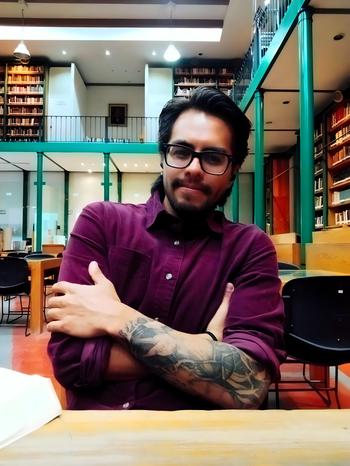Carlos Zúñiga Trejo

International Research Training Group 'Temporalities of Future in Latin America'
PhD Candidate
Sociology
Project: "The (De)structuring of Social Time in the Platform Economy: Inequalities in Web-Based Work"
Education
| Since 05/2025 | PhD Candidate in Sociology, El Colegio de México |
| 08/2020 – 06/2022 | Master in Population and Development, Latin American Faculty of Social Sciences (FLACSO), Mexico |
| 08/2017 – 12/2017 | Research stay, Institute of Ibero-America, Universidad de Salamanca, Spain |
| 08/2012 – 02/2016 | Bachelor in Political Science, Universidad Nacional Autónoma de México, Mexico |
Work Experience
| Since 05/2025 | Researcher, International Research Training Group ‘Temporalities of Future’, Berlin |
| 01/2017 – 07/2020 | Junior Researcher, Department of Applied Research and Public Opinion, Legal Research Institute (IIJ), Universidad Nacional Autónoma de México |
| 08/2016 – 06/2019 | Assistant Professor, Faculty of Political and Social Sciences, UNAM, Mexico |
| 08/2016 – 06/2019 | Research Assistant, Institute of Social Research (IIS), UNAM, Mexico |
| 08/2015 – 06/2017 | Research Assistant, Center for Political Studies, UNAM, Mexico |
Project: "The (De)structuring of Social Time in the Platform Economy: Inequalities in Web-Based Work"
In the digital economy, working time is no longer organized by fixed, socially agreed schedules. Instead, workers must adapt to fragmented rhythms, algorithmic controls and hyper-flexible conditions that erode the boundaries between work and personal life. This new temporal regime produces new forms of inequality, making time for thousands of people a commoditizable resource that is increasingly difficult to control.
This project analyzes how different types of web-based work platforms influence the temporal organization of work and daily life. Drawing on social acceleration theory and recent studies on labor in platform capitalism, we adopt a mixed and comparative methodological strategy that seeks to understand how platform design, economic precarity and individual strategies are articulated to shape unequal temporal experiences.
The study is based on the conviction that time is not a neutral resource, but a central terrain of dispute in digital capitalism. By examining how social time is distributed, valued and controlled, the project seeks to make visible the new labor regimes and their implications for people's temporal sovereignty. Ultimately, it seeks to raise awareness about the real cost of "flexibility" and to open spaces for imagining fairer and more sustainable work futures in Latin America and the world.
Articles
Zúñiga Trejo, C. (2019): "Sistema de comisiones: actividades e informes", in: Lisandro M. Devoto (ed.), Parlamento abierto. Experiencias y recomendaciones de apertura institucional para el Primer Congreso de la Ciudad de México, Ciudad de México: INFO CDMX, pp. 68–90.
Zúñiga Trejo, C. (2023): "La apertura en comisiones legislativas", in: K. Puente Martínez, L. M. Devoto (eds.), Apertura parlamentaria en México. Análisis y retos para el Congreso local de la Ciudad de México, Ciudad de México: Universidad Nacional Autónoma de México, pp. 65–79.
Chapter
Zúñiga Trejo, C. (2018), “La influencia política del sistema de comisiones de la Cámara de Diputados”, Revista Buen Gobierno, No. 24, Ene-Jun 2018, pp. 157-193.


